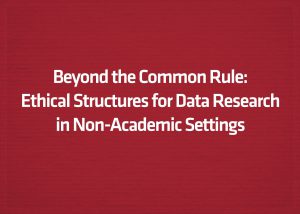Increasing Calls for a Big Data Dialog
Big Data promises to open new doors to curing diseases, cleaning the environment, and easing life’s burdens, but is it opening too many doors? Writing for The New York Times on Sunday, Steve Lohr suggested that the privacy challenges posed by Big Data are so large that it might trump any potential benefits. The surveillance possibilities permitted by data today, he noted, “could leave George Orwell in the dust.”
Whether privacy challenges should trump how we use data or vice versa, there is an obvious need for organizations and society at large to address what we hope to achieve with Big Data—and what we are willing to take off the table. In that spirit, FPF is joining with the Stanford Center on Internet and Society to host a day-long event this fall to tackle how best to bring together the value of data with the value of personal privacy. There should be some room for agreement. As Lohr notes, “corporate executives and privacy experts agree that the best way forward combines new rules and technology tools.”
Yet Big Data may require us to have a bigger discussion about how personal data is used. In response to research posted on Monday that concluded that anonymized data in the context of day-to-day location tracking can be re-identified with relative ease, David Mayer declares on GigaOM today that we need a “new realpolitik” for data privacy:
We are not going to stop all this data collection, so we need to develop workable guidelines for protecting people. Those developing data-centric products also have to start thinking responsibly – and so do the privacy brigade. Neither camp will entirely get its way: there will be greater regulation of data privacy, one way or another, but the masses will also not be rising up against the data barons anytime soon.
As Mayer concedes, it is impossible to stop our ever-increasing data collection capabilities, and even if we could, it would likely be to our greater detriment. While our legal constructs tend to view privacy as a binary all-or-nothing concept, our Big Data reality suggests that privacy be viewed as a spectrum in which benefits are weighed against the specter of the dictatorship of data. Who is doing what, for what purpose and for what benefit are important considerations, and it is past time for policy makers to begin engaging with these questions in earnest.



